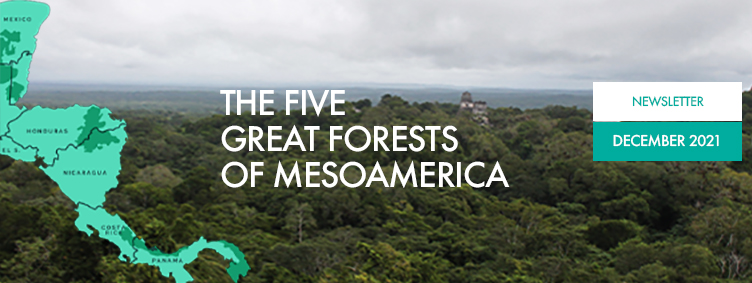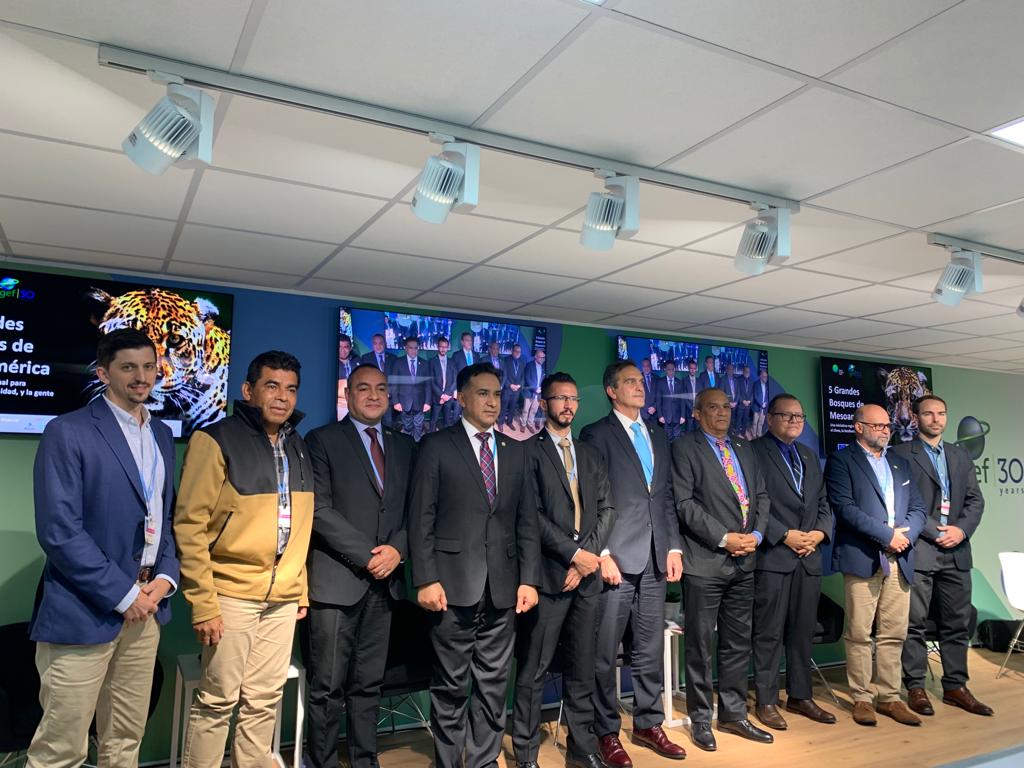Newsletter

Progress on The 5 Great Forests of Mesoamerica
SELVA MAYA · LA MOSKITIA · INDIO MAÍZ-TORTUGUERO · LA AMISTAD · EL DARIÉN
Download the newsletter
The 5 Great Forests of Mesoamerica, made up of La Selva Maya in Mexico, Guatemala and Belize; La Moskitia in Nicaragua and Honduras; Indio Maíz-Tortuguero in Nicaragua and Costa Rica; La Amistad in Costa Rica and Panama; and El Darién in Panama and Colombia, are currently threatened mainly by deforestation promoted by illegal cattle ranching and industrial agriculture. From 2000 to 2015, more than 30% of forest cover has been lost in the Honduran Moskitia.
Since 2019, through organizations such as Wildlife Conservation Society (WCS), Central American Commission for Environment and Development (CCAD), Mesoamerican Alliance of Peoples and Forests (AMPB) and ministries of environment, joined together to develop a long-term impact initiative to increase the resilience of "The Five Forests of Mesoamerica" with the participation of indigenous communities, civil society organizations, academia and governments.
This partnership drives collective and community collaboration to formulate the Concept Note and prepare the full proposal for consideration by the Green Climate Fund (GCF). The goal of the project is to create the enabling conditions for the countries and indigenous peoples of Mesoamerica to collaboratively develop and participate in a regional GCF program focused on the resilience of the Five Great Forests of Mesoamerica and the communities that depend on them.
STRATEGIC GOALS
To achieve the resilience of the Five Great Forests, the following objectives have been set:
- Address the main causes of deforestation by formulating policies that discourage them.
- Reforest and restore areas degraded by cattle ranching to maintain large contiguous tracts of forest.
- Align policies and improve governance to strengthen law enforcement and eliminate illegal livestock from key areas.
- Strengthen sustainable livelihood alternatives in conjunction with communities, involving gender-sensitive activities in economic development models.
LINES OF ACTION
This multi-sectoral initiative involves all stakeholders in a participatory manner and will improve governance and strengthen state and community forest management, promoting forest-compatible activities to replace cattle ranching. These include the promotion of beekeeping, community tourism, agroecology and other systems that are identified and support local livelihoods. As key principles, leadership by indigenous peoples in the formulation of the proposal will be ensured, and benefits will be brought to the ground in tangible ways to benefit local communities.
2030 GOALS
- 10 million hectares of protected forest
- 500,000 hectares of recovered forest
- 0 extinctions of species
- 0 illegal cattle ranching
- Improve human well-being

PROGRESS
To date, significant progress has been made:
- Consultation and dialogue processes with governments and regional entities, including 8 environment ministers, CCAD, park authorities, and the Central American Forestry Council, among others.
- Dialogues and mapping of indigenous peoples in Guatemala, Costa Rica, Panama, and Honduras, to establish coordination mechanisms and develop mapping of indigenous land tenure, titling and access to resources.
- Climate analyses, including revisions of the Nationally Determined Contributions (NDCs), as well as national and regional recommendations for the AFOLU 2040 initiative.
- Progress on the development of the programs.wcs.org/gcf-the5greatforests/ website (currently under construction).
- Analysis of deforestation, fires, and other threats to the Five Great Forests during 2020 and early 2021, with complementary funds.
- Hiring process for consultants in Gender and Equity, Protected Areas, and GIS, who will contribute to the collection of technical information for the formulation of the GCF Concept Note.
PARTICIPATION IN COP26 IN GLASGOW, SCOTLAND
During the United Nations Climate Change Conference (COP 26), WCS presented the initiative to increase visibility and engagement in global discussions, including the GCF / GEF pavilion. The participation of key stakeholders was achieved and can be visualized here.

NEXT STEPS
We continue with the development of the Concept Note, the results of which are based on: establishing mechanisms to improve governance in the five forests; continuing collaboration with CCAD in its response and integration to the challenges of climate change; updating the threats and conservation challenges of the five forests; and identifying and initiating activities to achieve an increase in natural resilience and the development of local capacities.
As part of the formulation process, over the next few months we will be in contact with our partners and government organizations to update information on the following topics, among others:
- Information and contact for the Technical Working Groups and other relevant liaisons for each entity.
- Data on protected areas, their status, threats, governance, and management capacities in the Five Great Forests region.
- Identification of sustainable economic alternatives and production practices in the Five Great Forests.
PRESS MENTIONS
Mentions and diffusion in local and international media. For more information, please contact us at wcsmesoamerica@gmail.com
